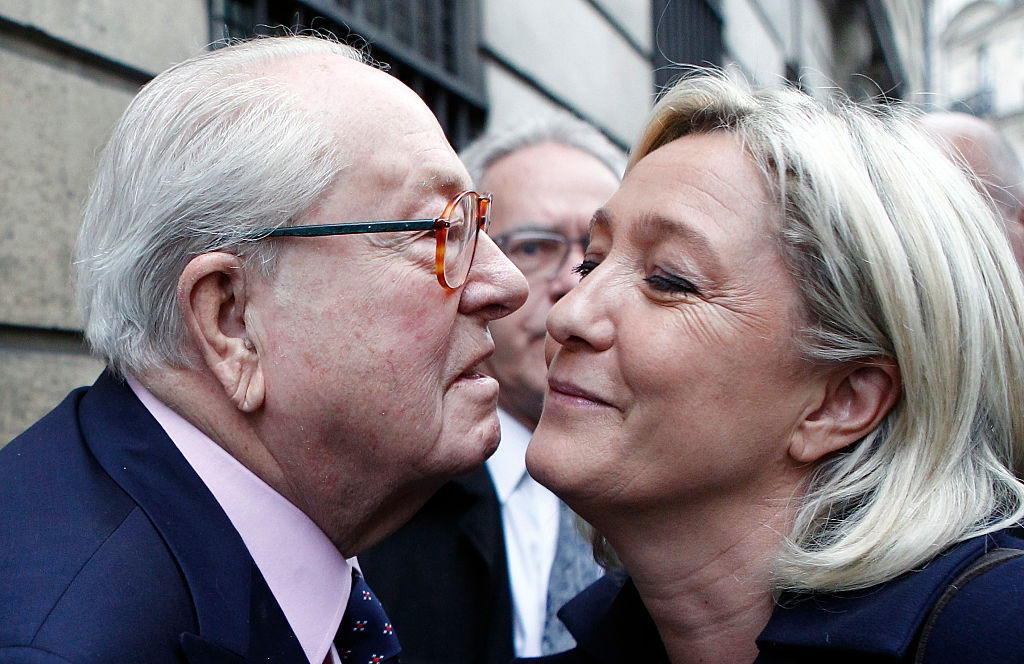Jean-Marie Le Pen: he thought he could save France. (Credit: Robert DEYRAIL/Gamma-Rapho via Getty)

21 April 2002 was a watershed date in post-war French politics. Turning on their televisions that evening, the French public heard the startling news that Jean-Marie Le Pen, leader of the Front National — a party boasting a former member of the Waffen SS among its founders — had qualified for the second round of France’s presidential election with 18% of the vote. After a political career spanning 46 years, Le Pen had erupted from the fringes into the mainstream of French life.
Le Pen was born on 20 June 1928, in the Breton fishing village of La-Trinité-sur-Mer. He was christened “Jean”, but later affixed his middle name “Marie” to his first, hoping that the reference to the Virgin would attract Catholic voters. The family origins were modest: his father was a fisherman, his mother a seamstress. Nicknamed the “Menhir” — the Celtic term for a prehistoric stone monolith — Le Pen made much of his Breton origins. Who, after all, could be more “French” than someone rooted in the soil of ancient France?
Le Pen’s father died in 1942, when his fishing boat hit a mine. Though an accident, he was accorded the statute of someone who had “died for France” and so his son became a “pupille” (ward) of the nation. A clever but undisciplined schoolboy, Jean-Marie was educated at both state and Catholic schools, and ultimately expelled from two. In 1946, he left Brittany to study at the law faculty in Paris, financing his studies by taking on small jobs. He soon discovered his taste for politics as a student activist at the head of the “Corpo” — the union of law students. At a time when French politics was dominated by the Left, the Corpo was ferociously anti-communist and committed to the defence of empire. From the start, then, Le Pen was firmly on the nationalist Right, sceptical of Resistance worship and sympathetic to the disgraced Vichy regime.
Handsome and dashing, the young Le Pen entered a bohemian world of hard drinking, womanising and partying. In 1958 he was a second in a duel — one of the last to ever happen in France — between the Marquis de Cuevas, a flamboyant ballet impresario, and the dancer Serge Lifar. With Le Pen, violence was never far away. Political meetings at this time frequently degenerated into violence, and Jean-Marie was always in the thick of it. When Jacques Isorni, Marshal Pétain’s former defence lawyer, stood for parliament in 1951, Le Pen’s Corpo formed part of his bodyguard, ready to rough up political opponents. Le Pen never fully abandoned this style of politics, even after entering the mainstream. In 1997, when supporting the candidature of one of his daughters at an election, the 70-year-old Le Pen plunged into a crowd of demonstrators, physically attacking the Socialist candidate. “Run away you red-headed faggot!” he shouted to one demonstrator. In the Sixties, when he first entered politics, Le Pen acquired an air of romantic menace by wearing a black eyepatch. For many years, he let it be known that he had lost his eye in a political brawl. The more mundane reality was that he’d suffered an accident while erecting a tent for a political meeting. Later, the eye patch was replaced by a less intimidating glass eye.

Instead of setting up as a lawyer after graduating, Le Pen enlisted in the army in order to serve in French Indochina, where his country was battling a communist-backed nationalist insurgency. This satisfied both his political convictions and his predilection for violence and adventure. But Le Pen arrived in Saigon just after the disastrous French defeat at Dien Bien Phu, in May 1954, and which effectively ended French hopes of holding on to its possessions in Southeast Asia. Le Pen returned to France a year later, bitter about those politicians who had been ready to sell out his beloved empire. He now joined Pierre Poujade and his anti-establishment movement. It had emerged as a popular protest against taxes — but soon became an expression of wider discontents about economic modernisation and perceived national decline.
Le Pen showed himself to be a brilliant campaigner and an exceptionally gifted orator. In January 1956, 53 Poujadists were elected to parliament, among them the 25-year-old Jean-Marie. In one characteristic early intervention in parliament, he attacked the Left-wing politician Pierre Mendes France: “Monsieur Mendes France you crystalise in your person a certain number of repulsions that are patriotic and almost physical”. Mendes France, a Gaullist during the war, had been the prime minister who’d ended the French presence in Indochina. Yet Le Pen’s mention of “physical” repulsion was widely assumed to be an antisemitic innuendo. Certainly, provocations and insults of this kind were the stock in trade of Le Pen’s style throughout his career.
Quickly realising that Pouajde lacked the political intelligence to capitalise on his electoral success, Le Pen decided to enlist as a paratrooper in Algeria, where a nationalist revolt had broken out against French rule. This choice again corresponded to Le Pen’s taste for action and his belief in the importance of France’s empire. It was also good publicity for a newly elected parliamentarian to show he was ready to fight for his country. Two decades later, Le Pen’s six months in North Africa would become controversial when he was accused of torture. As far back as 1956, he’d declared in parliament that torture was “necessary and just”. In a 1962 newspaper interview he was unequivocal: “I have nothing to hide. I tortured in Algeria because it was necessary to do so”.
By the Eighties, though, Le Pen had changed that “I” to a “we” — claiming he’d been describing the army generally rather than him personally. Even so, evidence about his activities continue to appear. In 1984, for instance, an Algerian claimed that as a child he’d witnessed the torture and death of his father at the hands of a French soldier. He then produced a dagger left behind by one of the killers. Engraved on it were the words “JM Le Pen 1REP”. Historians, for their part, have also uncovered extensive archival evidence of Le Pen’s personal involvement in torture, including a report in 1957 from a French police commissioner. Not to be dissuaded, Le Pen pursued several legal cases against people accusing him of torture. He lost every time. The conclusion, then, must be that Le Pen was a torturer, and an enthusiastic one at that.
De Gaulle’s return to power ultimately led to Algeria’s independence in 1962. During that year’s parliamentary elections, Le Pen lost his seat. In 1965, he became the campaign organiser for Jean-Louis Tixier-Vignancour, standing as the candidate of the extreme-Right against de Gaulle for the presidency. During the Second World War, Tixier-Vignancour had been a junior minister in the Vichy regime. He later acted as the defence lawyer for several French officers who’d launched a coup against de Gaulle, hoping that a change of government in Paris could forestall Algerian freedom.

The putsch failed — but in 1965, Le Pen proved himself a dynamic organiser and brilliant campaigner. As a warmup act, he outshone the candidate he was supposedly introducing. In the end, Tixier scored only 5% of the vote. Le Pen felt, as with Poujade, that he had greater leadership qualities than the politician he’d chosen to serve. For the moment, though, the prospects of the far Right were at rock bottom, and Le Pen earned his living by setting up a company producing discs of military music and marching songs. Among others, that included the “Horst Wessel Lied”, a Nazi anthem.
Le Pen returned to politics in 1973, as head of the newly formed Front National (FN), a union of various extreme Right organisations. The brains behind the new operation was François Duprat, a virulent antisemite and one of France’s earliest Holocaust deniers. He became an intellectual mentor to Le Pen, and after his assassination in by Right-wing rivals in 1978, Le Pen attended an annual memorial ceremony in Duprat’s honour. Le Pen was approached to be leader of the new FN because he’d once been an MP, giving him an aura of respectability. It also helped that he boasted an extensive address book of Right-wing contacts, while equally not being associated with any one specific group. His brilliant oratorical skills were another attraction.
The FN party said it supported a “national and social renewal” (redressement) — exactly the word Pétain had used in 1940 to describe his own vision for France. In the presidential election of 1974, Le Pen secured only 191,000 votes (0.75%). In 1981, he didn’t even gather enough signatures to be qualified to stand. But though he was still politically marginal, Le Pen’s personal situation changed dramatically when, in 1976, he inherited a colossal fortune from the Right-wing industrialist Hubert Lambert. The will was unsuccessfully contested by Lambert ‘s family, and Le Pen moved into a palatial new residence. A few months later, the house suffered a massive bomb attack. The bombing was possibly organised by a rival far-Right faction, though was more probably related to the contested inheritance. At any rate, Le Pen’s new-found wealth gave him political independence, and the FN practically became Le Pen’s family affair.

Politically, too, his fortunes were about to change. From the mid-Seventies, the post-war boom had started to stall. In response, Le Pen shifted his rhetoric away from imperial nostalgia and anti-communism towards a new theme: immigration. “One million unemployed equals one million too many immigrants,” was one new slogan. Le Pen also claimed that foreigners were responsible for alleged increases in delinquency and crime. His political breakthrough came at the municipal election of 1983, when an FN candidate was elected to the municipality of Dreux outside Paris. At the European elections the following year, the FN scored 11% of the vote. Suddenly, Le Pen had become a national figure. Invited for the first time to speak on television, he proved as effective a performer on the small screen as in public meetings: his truculent eloquence was a refreshing contrast to the slicker performances of most politicians. The FN received a further boost in 1986 when the Socialist President François Mitterrand, knowing that he risked losing forthcoming parliamentary elections, decided to introduce proportional representation as a way of splitting the Right-wing vote. At the elections, the FN duly obtained 35 seats. Le Pen returned to parliament for the first time since 1962.
He now sought to give himself international stature. He was photographed meeting Roland Reagan in 1987; he visited Saddam Hussein of Iraq in 1990. He also developed ties with Sung Myun Moon, the Korean leader of an anti-communist sect, who financed his campaigns. FN propaganda also mediatised the Le Pen family, showing the Breton paterfamilias with his wife Pierrette, and their three blonde, blue-eyed daughters. This vision of the happy family was shattered, however, when the marriage broke up and Pierrette posed in Playboy to embarrass her husband. The children sided with their father, and Le Pen remarried in 1991.
From the mid-Eighties, the rise of the FN seemed inexorable. At the presidential election of 1988, Le Pen scored 14.4% of the vote, coming fourth in the first round. In 1995, he slightly increased his score, coming fourth again. At municipal election in 1995, the party for the first time won control of four townhalls, including in Toulon. But though Le Pen was becoming a familiar figure of French politics, he hadn’t been entirely tamed. In 1987, during the trial of Klaus Barbie, Le Pen questioned whether the Nazi gas chambers had existed. As the Butcher of Lyon sat in court, Le Pen also called the Holocaust a “detail” of history. The following year, he made a sick joke about gas chambers. These opinions certainly expressed Le Pen’s own antisemitic convictions, but they were also calculated provocations to keep him in the news. No wonder one popular satirical TV show portrayed him as a vampire.
Some in the Front National began to wonder if Le Pen was serious about achieving political power, or whether he was happier being an eternal provocateur. Bruno Mégret, Le Pen’s deputy, pushed for an alliance with the centre-Right at the price of toning down some of his more extreme rhetoric. Mégret was far from a moderate — it was he who introduced the theme of Islamophobia into FN rhetoric — but Le Pen resented any challenge to his authority. Expelling Mégret from the party in 1998, he declared: “I am killing Brutus before Brutus kills me”. Mégret took most of the administrative infrastructure of the FN with him, and many believed that Le Pen was politically finished. Then came the bombshell presidential election of 2002 where, to universal surprise, Le Pen beat the Socialist candidate and qualified for the second round.
That bombshell result was partly the result of a split in the Left-wing vote in the first round. Yet it was also evidence that Le Pen was now appealing to many working-class voters, erstwhile Leftists but who felt the Socialists no longer spoke for them. In the end, of course, shock at Le Pen’s success pushed mainstream politicians into an alliance to defend democracy. During the election’s second round, Le Pen was trounced, barely improving on his first-round score.
What seemed like an inexorable rise seemed to have been checked at the next presidential election, in 2007, when Le Pen’s vote slipped to 10% and he found himself in fourth place after the first round. But this was because the successful candidate of the Right, Nicolas Sarkozy, shamelessly muscled into Le Pen’s territory, borrowing the FN leader’s themes of threatened national identity. What seemed like a setback was, in some sense, an ideological victory. As Le Pen had always said, in the long run voters would always “choose the original over the copy”. This proved prescient.
Sarkozy partly won in 2007 because he was young and dynamic, while Le Pen, just shy of his eightieth birthday, seemed like a figure from the past. Even he now realised it was time to pass the baton on. In 2011, his daughter Marine succeeded him at the head of the party, while her father remained the FN’s honorary president. Marine Le Pen, while in no way comprising the party’s core values, quickly set out to “detoxify” the brand, dropping the antisemitic and pro-Vichy references that repelled so many voters. Her strategy seemed to work: at the election of 2012, her 18% score in the election was more than Jean-Marie had ever achieved. But the incorrigible Le Pen, perhaps jealous of his daughter’s success, refused to play by the new rules. In 2015, he gave an interview defending Pétain. Marine Le Pen responded by expelling him from the party. This act of parricide ended Le Pen’s political career.
Yet the old bruiser still managed to cause a stir, publishing two volumes of memoirs. The first, appearing in 2018, was an instant bestseller. Its publication, just before the FN party congress, was timed to cause maximum embarrassment to Le Pen’s daughter. The memoir settled plenty of old scores and delivered a final verdict on de Gaulle. “A false great man whose destiny was to help France to become small,” Le Pen proclaimed at the very moment his daughter was busy adopting the general as a hero. Perhaps ironically, though, such provocations may ultimately have helped Marine campaign to present a more moderate façade — not that there’s any reason to think this was his plan.
Over an astonishingly long career — at his death he was the last surviving parliamentarian from the Fourth Republic — Le Pen had helped to transform the French political landscape. He was a precursor of the populist and racist nationalism that has now become the common currency of democratic politics. Eloquent and thuggish, charming and brutal, he was rooted in a long French tradition of far-Right politics. The Pétanism of the Forties was one incarnation, but Le Pen had the skill to adapt that heritage to the changed conditions of the Seventies and beyond. The man himself may now be dead, in short, but Lepenism still poisons the bloodstream of his nation’s politics








